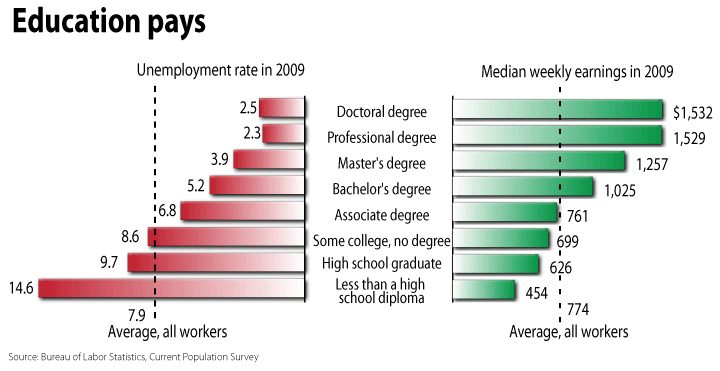Through observation, the most popular topics as measured by comments and pageviews are posts that are critical of higher education or student loans, posts that are about IQ or standardized testing, and lastly, minimum wages, basic income and Obamacare. This theory was affirmed when the half-pint Robert Reich published a satirical college commencement speech on Business Insider (or maybe Business Insider syndicated the story) about the bleak prospects facing newly minted graduates due to overwhelming student loan debt and low paying jobs. This article garnered over ninety comments (and counting) in just a few hours, well above the average of one to three comments for a typical Business Insider story.
This is nothing new. The left has written about student debt bubbles for years and they keep being wrong. Check out this google search of articles dated between 2005 and 2009 of failed predictions of a bubble.
A recent article from time.com about how student loans are ruining the economy continues in the leftist tradition of premature bubble prediction. The doom & gloom credo is to predict early and predict often.
But before we can address a solution, we need to address the cause. The rise of student loan debt is attributable to leftist efforts to mainstream college education so that it’s readily accessible to everyone, whereas in the past college was attended by those who could afford it or were smart enough reap the benefits of it. Nowadays, high school graduates who can’t even read their diplomas are attending college and we’re supposed to be surprised or sympathetic when they can’t find good paying jobs? Or that fifty percent of college enrollees don’t finish, squandering tuition money that could be have put to better use elsewhere? These are people that should have never been admitted to college. Less prestigious colleges will admit anything that passes the fog mirror test, provided it can pay the tuition. The solution is to better screen applicants and giving students more realistic advice about their post-secondary options, but because college is such a big business, many low aptitude applicants (and parents) will continue to be duped into thinking college is a ticket to success, when they just aren’t smart enough or mature enough to to take advantage of it. Or they earn a low paying, easy degree, which isn’t as big of a concern in an elite college, because the diploma and connections are worth the price alone; however, those admitted to odds-and-ends U don’t have this luxury.
Another reason college attendance is surging because in today’s cutthroat labor market having a degree gives an advantage over someone that doesn’t have one. Some employers require a degree, even if the job doesn’t necessitate it, because a candidate with a degree is believed to be more competent- and with supply far exceeding demand- employers can be as selective as they want. The unemployment rate for students with technical degrees like math, science, physics or computer science is substantially lower than the humanities; furthermore, jobs requiring technical skills pay much more, too. Very specialized jobs like surgery or endoscopy are not amenable to autodidacticism. As shown in the graph below, college grads earn more and are less likely to be unemployed. Those with STEM degrees have the best prospects of all.

Technically, any trend with an underlying exponential growth curve will appear like a bubble if viewed from a long enough time frame, including things that can’t go negative like compounded interest. Student loan debt tops one trillion, but in 2011 the average debt per student was only $23,300 (or about the cost of a car, but I don’t see the left protesting the auto companies)- a far less daunting number than the two to three hundred thousand dollars purported by the sensationalist media. Secondly, unlike a car, the value of a tuition appreciates, because of rising demand and costs to obtain it. Student loans are not like mortgages because they are non-dischargeable in bankruptcy. Additionally, the federal government is making a profit from student loans to the tune of $40 billion a year. College critics James Altucher and Robert Reich omit these facts. They also ignore the role of IQ in predicting college success, blaming failures on the job market or greedy corporations, when many people just aren’t intellectually cut out for college or choose easy, low paying majors. These are the same liberals that want to end psychometric testing, when more testing is, in fact, the most reasonable solution to the college problem. The second solution is personal responsibility. No one forced you to major in liberal studies, but don’t blame the government, the fed, or the 1-percent when employers can’t find a use for, say, a history of arts major when Wikipedia can fill that job for free.